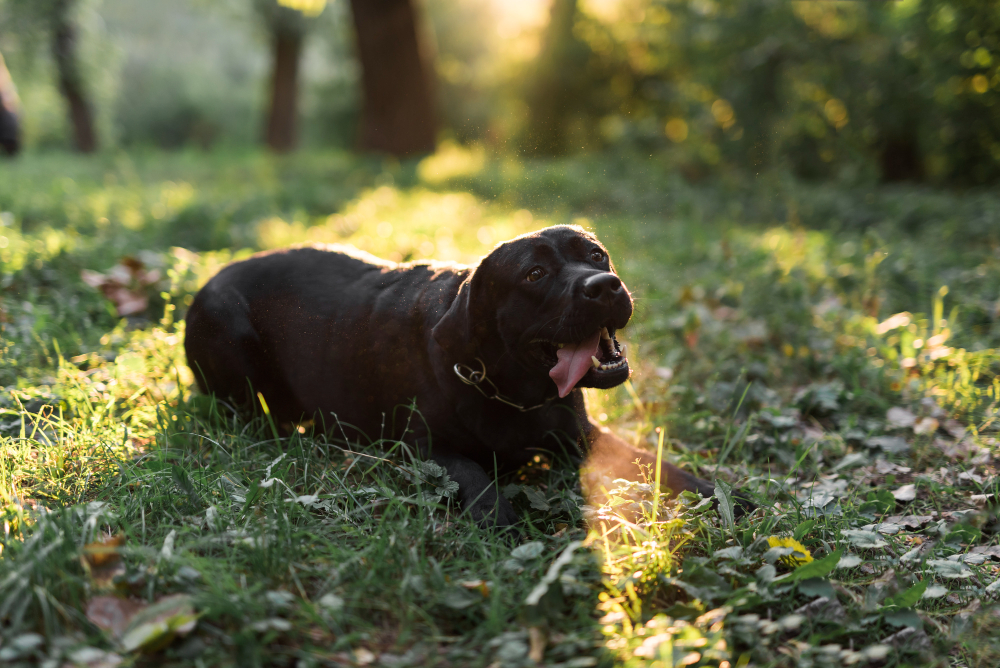What to Give a Dog for Constipation: A Vet’s Advice

Updated June, 23, 2025
Nobody likes to see their dog uncomfortable, especially when they’re struggling to go to the bathroom. Constipation in dogs isn’t uncommon, and while it’s usually temporary, it can still be distressing for both you and your pup.
The good news? Most cases of constipation can be managed at home once you recognize the signs to look for and take simple steps to help. Let’s walk through the causes, what to watch for, and how you can gently support your dog’s digestive health.
What Is Constipation in Dogs?
Dogs can occasionally have trouble with bowel movements. If your dog hasn’t pooped in more than a day or two, or if they seem to be straining or uncomfortable, they might be dealing with constipation.
Normally, healthy dogs go once or twice a day. When that rhythm changes, it could be a sign that something’s off, including diet, hydration levels, or lack of activity. By keeping an eye on their routine and learning what’s normal for your pup, you’ll be able to spot changes early.
Common Causes of Dog Constipation
There are quite a few reasons why a dog might become constipated. Here are some of the most common:
- Low-fiber diets: Fiber helps move things along in your dog’s digestive system. But not all dogs get enough of it in their diet. A low-fiber diet, especially one full of processed foods, can lead to slower digestion. Common fiber-rich additions include:
- 100% canned pumpkin (not the pie filling!)
- Leafy greens like kale or spinach (in small amounts—these can cause gas)
- Vet-approved fiber supplements like psyllium (unflavored Metamucil)
It’s best to talk to your vet before adding fiber to your dog’s diet, as too much can make constipation worse in some cases.
- Not enough exercise: Dogs need movement to stay regular, and exercise helps stimulate healthy digestion. If your dog seems backed up, try:
-
- Taking them for an extra walk
- Adding short play sessions throughout the day.
- Letting them sniff around outdoor areas, as the scent of other dogs can sometimes trigger a bathroom break!
- Dehydration: When your dog isn’t getting enough water, their body tries to conserve it, often by pulling extra moisture from their stool. This can cause the stool to become dry, hard, and difficult to pass. Make sure your dog always has access to fresh, clean water. You can make hydration easier (and more fun!) by:
-
- Using dog water fountains to encourage drinking
- Placing water bowls in multiple areas of your home
- Trying elevated bowls—just be cautious with large breeds prone to bloat
- Offering canned dog food, which contains extra moisture
Some of the other most common causes of constipation in dogs include:
- Blockages from eating non-food items like garbage, bones, gravel, or plants
- Too much self-grooming leads to hair collecting in the stool
- Age
- Hypothyroidism
- Renal issues
- Enlarged prostate
- Enlarged colon
- Anal gland problems
- Spinal injury
- Certain medications
- Surgery or anesthesia effects
- Stress or anxiety
- Tumors
- Trauma to the pelvis
Signs Your Dog Might Be Constipated
Spotting the signs of constipation is the first step in helping your dog. Sometimes, the symptoms can be subtle, but others are more noticeable. Here are a few common signs that might indicate your dog is constipated:
- Straining or having difficulty when trying to poop
- Passing small, hard, or dry stools
- Repeated but unsuccessful attempts to go to the bathroom
- Loss of appetite
- Lethargy or seeming less active than usual
- Vomiting or signs of stomach discomfort
- A bloated or visibly swollen belly
How to Help a Constipated Dog Go Quickly Using Home Remedies
Many pet owners prefer to start with natural solutions when dealing with constipation. Here are some effective home remedies to try that Kathleen Claussen, DVM recommended in her article:
“Most of the time, occasional constipation can easily be treated at home with lifestyle adjustments. You may be able to help ease your dog’s constipation with a home remedy, but make sure to talk to your vet first. Constipation can be a sign of more serious conditions.
If your dog is constipated, you can try these home remedies to relieve their pain:
- Pumpkin puree. This puree is high in fiber and moisture, it helps regulate the digestive tract, and 100% pumpkin puree is best. Do not give your dog pumpkin pie filling. You can feed your dog the puree straight from the can, and they will consider it a nice treat.
- Canned dog food. The softer food and higher moisture content will help regulate their digestive system and create softer stool. You should mix canned food in with their normal food to avoid an upset stomach.
- Dietary fiber supplements will increase fiber in their bodies, which will help soften their stool and regulate their bowel movements. Ask your veterinarian to recommend specific types and dosages of supplements for your dog.
- Access to fresh water makes sure they are well-hydrated. It is best to encourage your dog to drink plenty of water. If they are not drinking anything at all, you should seek veterinary care.
- Exercise. Take your dog for long walks to get their bowels moving and stimulate a healthy movement. Exercises like running, fetch, and chase are great ways to promote a healthy digestive tract. “
Why Untreated Constipation Can Be Risky
While mild constipation may not seem like a significant issue, if it persists for too long, it can lead to more serious problems. Here are a few risks associated with untreated constipation:
- Impaction: If stools become too hard and dry, they can get stuck in the colon, causing discomfort and requiring veterinary care.
- Intestinal blockage: A complete obstruction of the digestive tract, whether from a foreign object or hardened stools, can be life-threatening if not treated promptly.
- Dehydration: Ongoing constipation can make it harder for your dog’s body to absorb fluids, worsening dehydration.
- Electrolyte imbalances: Severe constipation can disrupt the balance of electrolytes in your dog’s body, leading to additional health concerns.
- Loss of appetite and weight loss: If your dog stops eating due to discomfort, weight loss can worsen their overall health.
- Lethargy and discomfort: Constipation can cause your dog to become sluggish and uncomfortable, impacting their mood and energy levels.
When It’s Time to See the Vet
While most mild cases of constipation resolve quickly, some situations call for expert care. Reach out to your vet if:
- Your dog hasn’t passed a bowel movement in more than 48 hours.
- There’s obvious discomfort or pain.
- You suspect a blockage or underlying illness.
- Your dog is a senior, a puppy, or has a chronic condition.
How Can Pet Insurance Help You if Your Dog Needs a Treatment?
Pet insurance can be a valuable tool in managing the costs of treating a dog’s veterinary expenses. By having a pet insurance policy in place, you can have peace of mind knowing that you can provide medical care for your furry companion without worrying about the financial burden. Pet insurance can help cover the costs of veterinary consultations, diagnostic tests, medications, and even specialized treatments if required.
Reimbursement
This method is the most common for pet insurance companies. You pay out of pocket for the veterinarian bill, and then the insurance company reimburses you for what’s covered under the insurance plan. The steps look like this.
- You pay the vet bill after your dog’s visit.
- You fill out the pet insurance claim form.
- Submit the claim form and other required documentation to the insurer.
- After the claim is approved, you will be reimbursed for eligible expenses.
What Does Odie Pet Insurance Cover?
Pet insurance covers various veterinary expenses, providing financial protection and peace of mind for pet owners. Here are the details of the coverage options offered by Odie Pet Insurance:
Illness & Injury Plan
The Illness & Injury Plan is an all-inclusive insurance plan designed to cover a wide range of medical needs for your pet. This plan includes comprehensive coverage for various illnesses, injuries, and veterinary services. Some of the covered items include:
- Veterinary exams and consultations
- Diagnostics (e.g., X-rays, lab tests)
- Prescribed medications
- Surgeries and hospitalization
- Rehabilitation, acupuncture, or chiropractic treatments
- Medically necessary supplies
The Wellness Plan
The Wellness Plan is a monthly membership that focuses on preventive care and covers routine veterinary services.
- Provides reimbursements for routine care items such as wellness visits (exams and vaccines), testing and parasite prevention, dental cleanings and at-home dental care, vitamins, supplements, and more.
- Through Odie’s partnership with Petivity, a leader in smart pet products and proactive care, Wellness Plan members can also receive reimbursements for Petivity devices and health kits, as well as eligible Purina food and supplements.
- Total reimbursement up to $700 per year.



